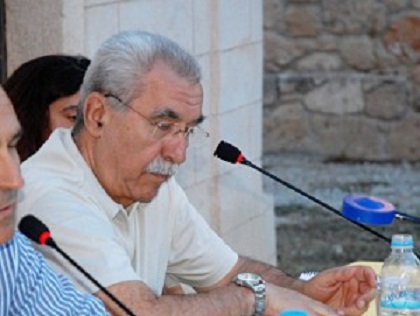Mayor D. Mourtzis: What’s his name? Wayne Hall: Juergen Link. He is a professor of literature. Paschalis Melissaris: He took the initiative along with other university people to compose a text against the misrepresentation of Greeks in relation to what they have already…. W.H.: Essentially it is a protest against the stance of the mass media in Germany and how they reproduce enemy images Mayor: So in the person of Mr. Link we have someone who is a friend and an ally who is interested in our history… W.H.: He is a Philhellene and he started this movement before the elections… P.M.: It isn’t starting now… W.H.: Before the present government came in…. But there is a whole sequence of events after the appeal. An open letter to Mrs. Merkel and other messages to his supporters. For there are around 1,500-1,600 Germans and others supporting the initiative. But it is something that deserves an answer, a response, from Greece. Mayor: Should we invite them to a meeting? W.H.: As you can see…. This letter was written with support from three associations: the Aegina Association of Active Citizens, the Ioannis Capodistrias Cultural Association, the Aegina Women’s Association. Mr. Melissaris corrected the … Continue reading
Category Archives: European Integration / Democracy
Sunday, 23rd November 2008 17.55 From Aegina Portal (translated) An international conference whose style and content provide a glimpse of the importance of the island and its history was held in Aegina, with proceedings opening yesterday Saturday at the Hotel Danae. The international conference took place in the context of the celebration of the 180th anniversary of the swearing-in of Ioannis Capodistrias and forms part of the commemorative celebrations programmed for this year by the Municipality of Aegina. The promotion of the Capodistrias – Spinelli activities in relation to the European integration project began to be promoted approximately two years ago by Mr. Wayne Hall, both from within an informal group around the subject in question, and through the exchange of relevant correspondence and personal contacts with the Municipality of Aegina and other groups on the island with the potential for involvement. Yesterday’s conference emerged from an initiative by Messrs. Alexis Krauss and Wayne Hall, implemented by the Association of Active Citizens under the auspices of the Municipality of Aegina. The potential of this international conference was obvious from the moment it was announced, i.e. that it could significantly strengthen promotion of the content of Ioannis Capodistrias’ politics, which – … Continue reading
(Giulietto Chiesa was a key speaker at the Aegina Society of Active Citizens’ function “Capodistrias and Spinelli today – European Union: Disintegration or a new beginning?”, held in Aegina on 23rd June 2013.)
Function: http://main.cse-initiative.eu/?p=111 // VIDEO
G. Chiesa’s visit to the Capodistrian buildings of Aegina: VIDEO
Persuading Daniel Cohn-Bendit of the importance of Capodistrias: VIDEO
Statement
The crisis in Ukraine, which clearly affects the international community, is a matter for deep concern, threatening both the sovereignty of Ukraine and the independence of Europe, triggering an unwelcome polarisation of the international system and impacting an always fragile geopolitical balance.
We would like it to be borne in mind that a historical transition from a unipolar world – with the US as the sole superpower – towards a multipolar world is underway and that this process should be aided and abetted rather than contained. The whole world, including Europe and the United States, will gain from a jointly-conducted re-organisation of global governance that recognizes multipolarity.
We believethat Europe is able to contribute positively to the peaceful emergence of a multipolar world. Indeed the Ukrainian crisis has shown that, while an independent and open Europe provides grounds for the emergence of a multipolar world, a one-sided Europe creates the conditions for a world polarized between a Western bloc and the new global powers.
Therefore, we strongly oppose the disruption of Euro-Russian relations, with the deployment of troops on both sides of the Euro-Russian border, and in particular of US military troops on Europe’s territory, with the growing tensions provoked by the uncoordinated free-trade policies of Europe and Russia on common border countries such as Ukraine, Georgia, and Moldova.
We consider that the Ukrainian crisis calls for the establishment of a diplomatic arena to discuss Europe’s and Russia’s rights to organize their common markets in a framework of peaceful coexistence.
We note the humanitarian emergency situation in Ukraine and crimes and abuses committed against the civil populations during the Ukrainian crisis and urge that these should be promptly dealt with and investigated.
We believe that the Euro-BRICS framework of co-operation can provide the proper mediation that is required for a positive outcome to be achieved.
The situation requires global leaders with a high sense of historical responsibility and collective interest.
We believe that responsibilities for the crisis in Ukraine must be shared between Europe and Russia. On the basis of the recognition of each player’s responsibilities it will become possible to rebuild peace in Ukraine and revive Euro-Russian relations.
RESUMING EURO-RUSSIAN RELATIONS TO CREATE THE CONDITIONS FOR A UKRAINIAN-LED CRISIS RESOLUTION
It is up to the Ukrainian people to organize and rebuild peace in Ukraine. However there is no way tensions between the pro-Russian and pro-European Ukrainians will de-escalate if tensions between Russia and Europe do not de-escalate first. Therefore, for the sake of peace in Ukraine, we require European and Russian leaders to re-launch a constructive dialogue, in particular encouraging the media to provide more objective information and correct any misinformation that might lead to future conflict.
Note This draft is almost completely extracted from a joint declaration of academicians, professors, journalists, former political personalities of the BRICS countries. I believe that a dialogue could be built on this basis.
Giulietto Chiesa
N.B. The English text of the EuroBRICS joint declaration on Ukraine is at:
With English subtitles.
